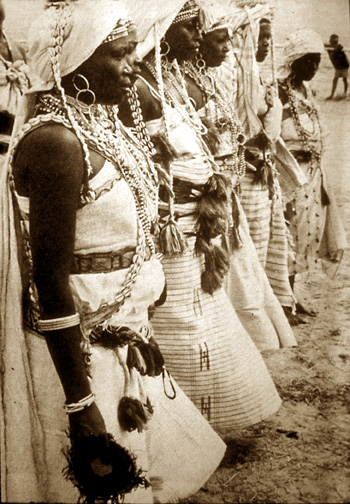Bori religion
Bori is the traditional obsession with the cult of the Hausa, which was practiced until the introduction of Sharia in 2000 in all Hausa cities in Northern Nigeria.
All members of the Bori cult see themselves as Muslims. Her cult is tolerated by tolerant Muslims, as the former deities of worship today as a spirit being ( iska, Pl iskoki ) are considered. As part of the enforcement of Sharia in the cult of radical states such as Zamfara, Sokoto, Kano and partly Kebbi was completely eliminated. In tolerant states it is the adept continue to be allowed to practice their cult in enclosed spaces among themselves.
The Bori Adepts unite on special occasions, and with singing and music, the active members turn into media of their spirits. The leading musical instrument in performing the dance ceremony is the one-stringed spike fiddle Goge. Add to this the hourglass Kalangu and percussive used calabashes or metal canister. Participants will be dressed accordingly and they behave then as the gods they represent. The songs of praise to the spirits and the behavior of the media provide important clues to reconstruct the pre-Islamic world of the gods of the Hausa. This material can also be used to understand the former sacral kingdoms of the Hausa.
In addition to the well-studied of the ethnological research Bori cult in northern Nigeria, there are less well-known obsession with cults like Badiri at the Shuwa Arabs, Badire at the Kotoko and Gusa vala at the Malgwa. For the latter ritual plays a flute orchestra ( Gulve ), gourd rattle and water drum. Comparable possessive spirits in Africa are the Vimbuza Ghost in Zambia and Malawi and Pepo Ghost in Tanzania. In the Islamic context, there is the Zar cult in Egypt and Sudan, the Derdeba - cult among the Gnawa in Morocco, which corresponds to the Tunisian Stambali, the spirit Aisha Qandisha in Morocco and the Tuareg spirits with music tend to be placated.










